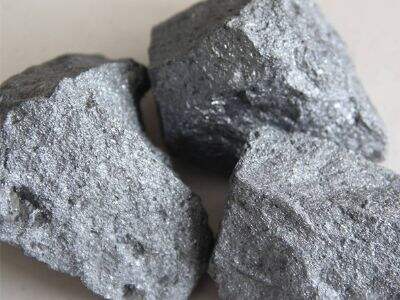The miracle of silicon or How modern manufacturing processes were transformed
Silicon is an extraordinary material which has become increasingly significant in the present production processes. Silicon: Transforming the Dirty IndustrySilicon is revolutionising the production of clean, eco-conscious industrial materials! We take a closer look at how this wonder-working element is transforming the production of goods, and why it's so critical to shaping sustainable future processes for manufacturing industries.
How silicon could be the solution to clean, eco-friendly industrial materials
Silicon is an abundant element found naturally in the Earth's crust. It has unique characteristics that lend it to be used in certain products and manufacturing processes. The refractories, ingredients that can resist high heat, are largely produced with silicon. The refractories that are made of silicon will be using in the furnaces and kilns which need a high level of heating.
Silicon : Silicon is used not only in refractories but also as a vital element in the production of alloys. Alloys consist of different metals, which come together to give new materials with improved characteristics. The addition of silicon metal 553 to alloys can provide them with better resistance to deformation, increased corrosion protection and improved tensility without affecting the density of the base metal making it suitable for a broad range of industrial applications.
Applications Of Silicon In A Sustainable Manufacturing Process
The difficulty here is that silicon is so useful and exotically irreducible, a material without which our march towards a greener production path would be severely hamstrung. The use of silicon for industrial materials production decreases the requirement for ingrained resources and reduces environmental footprint making products more sustainable.
The use of silicon in solar panels is one of the primary ways that silicon is employed to help with sustainable manufacturing efforts. Photovoltaic cells that transfer sunlight to electricity require silicon as the basis. Manufacturers can use the sun to decrease their need for fossil fuels and reduce carbon emissions.
Silicon is even used in the manufacturing of energy-efficient lighting solutions such as LED bulbs. They consume less energy than traditional incandescent bulbs which saves electricity and decreases GHG emissions. By using silicon in their products, manufacturers can make industrial production more environmentally sustainable.
How Silicon Could Help Us Reduce Our Environmental Footprint and Increase Efficiency in Industrial Production
Its usage has significantly diminished the environmental detrimental effect of various industrial manufacture processes, such as for Silicon 441. Manufacturers can waste less, use less energy, and emit fewer harmful pollutants by making clean materials from silicon.
Silicon has a notable role in decreasing the environmental repercussions, providing an alternative in insulator materials. Silicon-based insulators have very high thermal insulation capabilities that absorb heat and resist energy loss, so less energy is required to keep buildings heated and indoors cool during summer. Insulation materials that contain silicon can reduce energy consumption and mitigate carbon footprints in production.
Silicon is also employed in the manufacture of lightweight materials such as aluminum-silicon alloys. These materials are much stronger and durable than any traditional metal but they are also lighter then the metals that help to reduce fuel consumption in transport and decrease global warming. These silicon-complemented materials allow for the production of more effective and eco-friendlier products.
Further Validation of the Growing Role of Silicon on Our Way to a More Sustainable Manufacturing Industry
Silicon As demand increases for clean, eco-friendly industrial materials also bodes well for the semiconducting silicon with a greener future in industries that rely on manufacturing. Silicon: With its incredible attributes and usages, silicon will also transform the future of manufacturing and reduce our carbon footprint.
The sustainable manufacturing applications for silicon is one example, where silicon metal 97 uses in the production of Silicon Carbide ceramics. These ceramics are more robust and heat-resistant than any other, which is why they can be used in high-temperature scenarios like the insides of furnaces or engines. Silicon carbide ceramics help manufacturers to provide longer lasting and enduring products with better final stage energy efficiency.
And silicon also serves as a raw material for producing silicon-based lubricants, which can reduce friction and increase the productivity of machines. Manufacturers can achieve longer equipment life, less frequent maintenance and lower operating costs, by utilizing silicon-based lubricants. They aim to make operating in the industrial space more affordable, for which these are resources they need to create a livable future.
In summary, silicon has flexible and innovative property that is now defining clean, healthy industrial products. Silicon is being used in a variety of ways to both extend the operational lifetime and decrease environmental impact of goods, working to make the needed transition possible. With the integration of silicon production, Xinda will advance an industry that is synonymous with waste and environmental harm.
Table of Contents
- The miracle of silicon or How modern manufacturing processes were transformed
- How silicon could be the solution to clean, eco-friendly industrial materials
- Applications Of Silicon In A Sustainable Manufacturing Process
- How Silicon Could Help Us Reduce Our Environmental Footprint and Increase Efficiency in Industrial Production
- Further Validation of the Growing Role of Silicon on Our Way to a More Sustainable Manufacturing Industry
 EN
EN
 AR
AR
 NL
NL
 FR
FR
 DE
DE
 HI
HI
 IT
IT
 JA
JA
 KO
KO
 PT
PT
 RU
RU
 ES
ES
 TL
TL
 ID
ID
 SR
SR
 UK
UK
 VI
VI
 TH
TH
 TR
TR
 FA
FA
 MS
MS
 BE
BE
 AZ
AZ
 UR
UR
 BN
BN
 GU
GU
 JW
JW
 KM
KM
 LO
LO
 LA
LA
 NE
NE
 PA
PA
 TA
TA
 TE
TE
 MY
MY
 UZ
UZ
 KU
KU
 KY
KY
 LB
LB
 SD
SD






